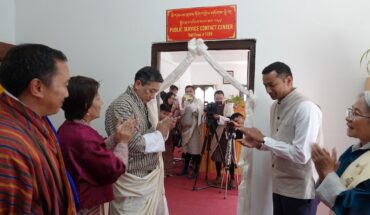
KINZANG DORJI TSHERNG
Thimphu
In a unanimous decision, the National Assembly has taken a resolute stance against the proliferation of pornographic, violent, and unethical content circulating through digital platforms in Bhutan.
With MPs sounding the alarm over its corrosive effects on youth and national values, the Assembly called for immediate and uncompromising enforcement of existing laws, enhanced monitoring capabilities, and widespread public education.
The motion, introduced by Lamgong-Wangchang MP Sonam Tashi, received full support from all 41 Members of Parliament present.
The MP described the issue as a “national emergency”, citing rapid technological advancement—particularly the rise of Artificial Intelligence (AI)—as a catalyst for the unchecked spread of harmful material online.
“Our Constitution guarantees rights, but it also allows restrictions in the name of public morality, unity, and security,” MP Sonam Tashi reminded the House.
He said the country today, is witnessing a digital crisis that is undermining the very foundation of our culture and society.
The MP added the motion was inspired by the core principles of Gross National Happiness, especially the pillar of cultural preservation, and that immediate intervention was necessary to safeguard the country’s youth and protect its national identity.
He further emphasized that the growing exposure to explicit and violent content is leading to the erosion of values among young people, contributing to behavioral and mental health issues, and threatening Bhutan’s cultural cohesion and sovereignty.
Existing laws already provide a robust legal foundation to address these challenges. The Bhutan Information, Communications and Media Act of 2018 empower authorities to regulate content and protect users.
The 2019 Rules and Regulations on Content require all media to reflect Bhutanese values. The Penal Code of Bhutan criminalizes obscene and inappropriate content: Section 381 defines lewd and lascivious conduct as a petty misdemeanor, while Section 476(A) treats computer pornography as a misdemeanor offense.
However, enforcement remains weak. Lawmakers said that the responsible agencies lack the technological tools, manpower, and coordination necessary to effectively implement these laws—particularly against newer threats like AI-generated content and fast-evolving social media platforms.
To address these gaps, MP Sonam Tashi outlined specific recommendations to help enforce current laws with zero tolerance and establishing a dedicated and well-equipped Content Monitoring and Enforcement Division under BICMA.
In addition, launching a nationwide digital ethics awareness campaign led by the Ministry of Home Affairs and the Ministry of Education and Skills Development was also suggested.
Further, reviewing BICMA’s institutional capacity and potential legal reforms, and enhancing coordination among relevant agencies were some other recommendations.
Thimphu resident and mother Kinley Chhimi supported the Assembly’s move but urged a stronger role for schools and the education system.
“Today’s children are raised with smartphones in hand, but they are ill-prepared for the dangers that come with it,” she said, adding digital education must go beyond technical skills and cover ethical use, privacy, and mental well-being.
She called on the Ministry of Education & Skills Development to integrate comprehensive digital literacy programs into school curricula, covering not just internet safety but also critical thinking, online etiquette, and emotional resilience.
The government has already launched some preliminary initiatives. The Department of Law and Order (DLO), for instance, has been conducting awareness programs targeting students and civil servants.
Between 2022 and 2023, over 15,000 individuals participated in campaigns addressing hate speech, online harassment, and divisive content.
Home Minister Tshering also shared alarming statistics. From 2022 to 2023, the Royal Bhutan Police recorded 235 online scam cases involving losses of nearly Nu 27 million, of which only Nu 12 million has been recovered.
Additionally, 334 individuals were caught engaging in online gambling, with 127 cases referred to the police and the associated accounts frozen.
These figures, he said, highlight the scale of criminal activity in the digital space and the urgent need for stronger enforcement mechanisms.
MP Loday Tsheten of Gangzur-Minjey expressed frustration at the lack of technical interventions to prevent access to harmful content.
“The public understands the risks, but technical agencies have yet to take adequate measures to block this content,” he said. “It is critical for agencies like GovTech to step up with advanced tools and safeguards.”
MP Kuenga of Nyishog-Saephu addressed the public misconception surrounding digital rights. While the Constitution protects the right to access information, it does not give license to misuse that access.
“Many people wrongly equate access with impunity. We must instill a clearer understanding of digital responsibilities and promote ethical online conduct,” he said.
Shompangkha MP Tek Bahadur Rai expressed concern over the vulnerability of children, arguing that the lack of effective restrictions on explicit content poses serious risks to their development.
“Unfiltered access can disrupt education, trigger psychological issues, and lead to harmful behaviors,” he warned.
He urged immediate safeguards to shield children from such threats and called for child-focused education and monitoring systems to be implemented without delay.
The Assembly also addressed the dangers posed by deepfakes—realistic AI-generated videos and images that can manipulate public perception or damage individual reputations.
Lawmakers pointed out that Bhutan lacks both public awareness and legal frameworks to effectively combat these threats.
As deepfake content becomes more sophisticated, they said, it could be used to spread misinformation or target individuals for harassment and blackmail.
The proposed establishment of a content monitoring division under BICMA is seen as a major institutional reform that could greatly enhance enforcement.
MPs also emphasized that reviewing existing laws to address evolving technological realities—especially those driven by AI—is now a national priority.
Beyond legislative and institutional reforms, awareness and education will remain at the heart of Bhutan’s digital strategy.
Lawmakers and citizens alike believe that the success of these initiatives will depend on how effectively they engage the public—especially youth.
Schools, families, civil society organizations, and the media all have a critical role to play in building a digitally resilient population.
The government has already initiated platform monitoring through relevant agencies since April this year.
Meanwhile, the Ministry of Education and Skills Development is rolling out sex education and digital literacy programs in schools, aimed at fostering ethical behavior and resilience among young users.





